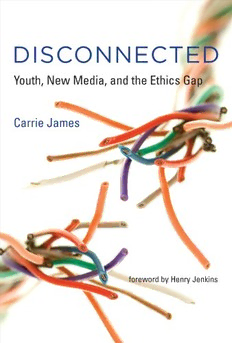
Young People, Ethics, and the New Digital Media: A Synthesis From the Good Play Project PDF
Preview Young People, Ethics, and the New Digital Media: A Synthesis From the Good Play Project
Disconnected The John D. and Catherine T. MacArthur Foundation Series on Digital Media and Learning Engineering Play: A Cultural History of Children’s Software, by Mizuko Ito Hanging Out, Messing Around, and Geeking Out: Kids Living and Learning with New Me- dia, by Mizuko Ito, Sonja Baumer, Matteo Bittanti, danah boyd, Rachel Cody, Becky Herr-Stephenson, Heather A. Horst, Patricia G. Lange, Dilan Mahendran, Katynka Martínez, C. J. Pascoe, Dan Perkel, Laura Robinson, Christo Sims, and Lisa Tripp, with contributions by Judd Antin, Megan Finn, Arthur Law, Annie Manion, Sarai Mitnick, David Schlossberg, and Sarita Yardi The Civic Web: Young People, the Internet, and Civic Participation, by Shakuntala Banaji and David Buckingham Connected Play: Tweens in a Virtual World, by Yasmin B. Kafai and Deborah A. Fields The Digital Youth Network: Cultivating New Media Citizenship in Urban Communities, edited by Brigid Barron, Kimberley Gomez, Nichole Pinkard, and Caitlin K. Martin Connected Code: Children as the Programmers, Designers, and Makers for the 21st Century, by Yasmin B. Kafai and Quinn Burke Disconnected: Youth, New Media, and the Ethics Gap, by Carrie James The Interconnections Collection: Understanding Systems through Digital Design, developed by Kylie Peppler, Melissa Gresalfi, Katie Salen Tekinbaş, and Rafi Santo Gaming the System: Designing with Gamestar Mechanic, by Katie Salen Tekinbaş, Me- lissa Gresalfi, Kylie Peppler, and Rafi Santo Script Changers: Digital Storytelling with Scratch, by Kylie Peppler, Rafi Santo, Melissa Gresalfi, and Katie Salen Tekinbaş Short Circuits: Crafting E-Puppets with DIY Electronics, by Kylie Peppler, Katie Salen Tekinbaş, Melissa Gresalfi, and Rafi Santo Soft Circuits: Crafting E-Fashion with DIY Electronics, by Kylie Peppler, Melissa Gresalfi, Katie Salen Tekinbaş, and Rafi Santo Inaugural Series Volumes Six edited volumes were created through an interactive community review process and published online and in print in December 2007. They are the precursors to the peer-reviewed monographs in the series. For more information on these vol- umes, visit http://mitpress.mit.edu/books/series/john-d-and-catherine-t-macarthur -foundation-series-digital-media-and-learning. Disconnected Youth, New Media, and the Ethics Gap Carrie James The MIT Press Cambridge, Massachusetts London, England © 2014 Massachusetts Institute of Technology All rights reserved. No part of this book may be reproduced in any form by any electronic or mechanical means (including photocopying, recording, or information storage and retrieval) without permission in writing from the publisher. MIT Press books may be purchased at special quantity discounts for business or sales promotional use. For information, please email [email protected]. This book was set in Stone by the MIT Press. Printed and bound in the United States of America. Library of Congress Cataloging-in-Publication Data James, Carrie. Disconnected : youth, new media, and the ethics gap / Carrie James. pages cm — (The John D. and Catherine T. Macarthur Foundation series on digi- tal media and learning) Includes bibliographical references and index. ISBN 978-0-262-02806-6 (hardcover : alk. paper) 1. Internet and youth. 2. Internet—Moral and ethical aspects. 3. Parental influ- ences. I. Title. HQ799.9.I58J36 2014 004.67′80835—dc23 2014003873 10 9 8 7 6 5 4 3 2 1 For Ella and Talia, my young digital citizens Every technology is both a burden and a blessing; not either-or, but this-and-that. —Neil Postman1 Technology celebrates connectedness but encourages retreat.… The flow of water carves rock, a little bit at a time. And our personhood is carved, too, by the flow of our habits.… The more distracted we become, and the more emphasis we place on speed at the expense of depth, the less likely and able we are to care. We often use technology to save time, but increasingly, it either takes the saved time along with it or makes the saved time less present, intimate, and rich. I worry that the closer the world gets to our fingertips, the farther it gets from our hearts. It’s not an either/or—being “anti-technology” is perhaps the only thing more foolish than being unquestioningly “pro-technology”—but a question of balance that our lives hang upon. —Jonathan Safran Foer2 Contents Series Foreword xi Foreword by Henry Jenkins xiii Acknowledgments xxvii 1 Morality, Ethics, and Digital Life 1 2 Privacy 23 3 Property 47 4 Participation 73 5 Correcting the Blind Spots, Reconnecting the Disconnects 101 Appendix: About the Research 123 Notes 131 Index 161
